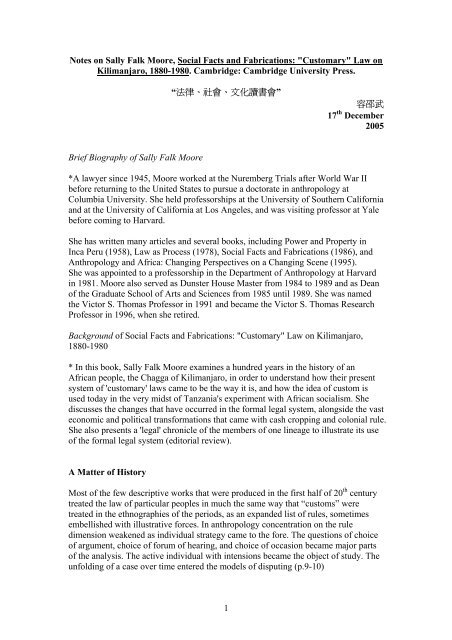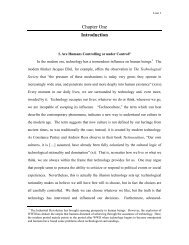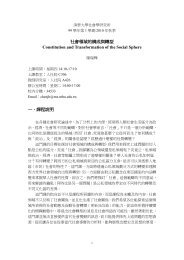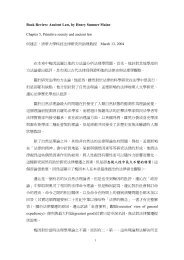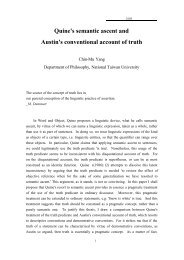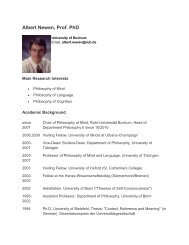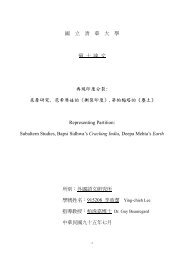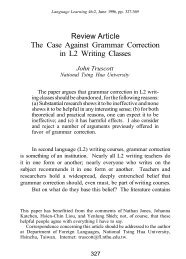1 Notes on Sally Falk Moore, Social Facts and Fabrications ...
1 Notes on Sally Falk Moore, Social Facts and Fabrications ...
1 Notes on Sally Falk Moore, Social Facts and Fabrications ...
You also want an ePaper? Increase the reach of your titles
YUMPU automatically turns print PDFs into web optimized ePapers that Google loves.
<str<strong>on</strong>g>Notes</str<strong>on</strong>g> <strong>on</strong> <strong>Sally</strong> <strong>Falk</strong> <strong>Moore</strong>, <strong>Social</strong> <strong>Facts</strong> <strong>and</strong> Fabricati<strong>on</strong>s: "Customary" Law <strong>on</strong><br />
Kilimanjaro, 1880-1980. Cambridge: Cambridge University Press.<br />
“ 法 律 、 社 會 、 文 化 讀 書 會 ”<br />
容 邵 武<br />
17 th December<br />
2005<br />
Brief Biography of <strong>Sally</strong> <strong>Falk</strong> <strong>Moore</strong><br />
*A lawyer since 1945, <strong>Moore</strong> worked at the Nuremberg Trials after World War II<br />
before returning to the United States to pursue a doctorate in anthropology at<br />
Columbia University. She held professorships at the University of Southern California<br />
<strong>and</strong> at the University of California at Los Angeles, <strong>and</strong> was visiting professor at Yale<br />
before coming to Harvard.<br />
She has written many articles <strong>and</strong> several books, including Power <strong>and</strong> Property in<br />
Inca Peru (1958), Law as Process (1978), <strong>Social</strong> <strong>Facts</strong> <strong>and</strong> Fabricati<strong>on</strong>s (1986), <strong>and</strong><br />
Anthropology <strong>and</strong> Africa: Changing Perspectives <strong>on</strong> a Changing Scene (1995).<br />
She was appointed to a professorship in the Department of Anthropology at Harvard<br />
in 1981. <strong>Moore</strong> also served as Dunster House Master from 1984 to 1989 <strong>and</strong> as Dean<br />
of the Graduate School of Arts <strong>and</strong> Sciences from 1985 until 1989. She was named<br />
the Victor S. Thomas Professor in 1991 <strong>and</strong> became the Victor S. Thomas Research<br />
Professor in 1996, when she retired.<br />
Background of <strong>Social</strong> <strong>Facts</strong> <strong>and</strong> Fabricati<strong>on</strong>s: "Customary" Law <strong>on</strong> Kilimanjaro,<br />
1880-1980<br />
* In this book, <strong>Sally</strong> <strong>Falk</strong> <strong>Moore</strong> examines a hundred years in the history of an<br />
African people, the Chagga of Kilimanjaro, in order to underst<strong>and</strong> how their present<br />
system of 'customary' laws came to be the way it is, <strong>and</strong> how the idea of custom is<br />
used today in the very midst of Tanzania's experiment with African socialism. She<br />
discusses the changes that have occurred in the formal legal system, al<strong>on</strong>gside the vast<br />
ec<strong>on</strong>omic <strong>and</strong> political transformati<strong>on</strong>s that came with cash cropping <strong>and</strong> col<strong>on</strong>ial rule.<br />
She also presents a 'legal' chr<strong>on</strong>icle of the members of <strong>on</strong>e lineage to illustrate its use<br />
of the formal legal system (editorial review).<br />
A Matter of History<br />
Most of the few descriptive works that were produced in the first half of 20 th century<br />
treated the law of particular peoples in much the same way that “customs” were<br />
treated in the ethnographies of the periods, as an exp<strong>and</strong>ed list of rules, sometimes<br />
embellished with illustrative forces. In anthropology c<strong>on</strong>centrati<strong>on</strong> <strong>on</strong> the rule<br />
dimensi<strong>on</strong> weakened as individual strategy came to the fore. The questi<strong>on</strong>s of choice<br />
of argument, choice of forum of hearing, <strong>and</strong> choice of occasi<strong>on</strong> became major parts<br />
of the analysis. The active individual with intensi<strong>on</strong>s became the object of study. The<br />
unfolding of a case over time entered the models of disputing (p.9-10)<br />
1
To the extent that this book asks the questi<strong>on</strong> how the distinctive legal aspects of the<br />
way of life of the Chagga people came to the way they are today, the story is an<br />
account of the transformati<strong>on</strong> of a traditi<strong>on</strong>. But it is also the story of the making of a<br />
new polity <strong>and</strong> ec<strong>on</strong>omy in which “traditi<strong>on</strong>al” law has come to have a very different<br />
significance from what it <strong>on</strong>ce had. What has been attempted, in a broad sense, is a<br />
metamorphic analysis which includes both an account of alterati<strong>on</strong>s within the<br />
traditi<strong>on</strong> itself <strong>and</strong> a sketch of the overwhelming changes in its political/ec<strong>on</strong>omic<br />
c<strong>on</strong>text (p.10).<br />
The Practice of Rules<br />
The scope of inquiry changed. The articulati<strong>on</strong> of different levels of organizati<strong>on</strong> <strong>and</strong><br />
of different social/cultural fields became a major problem to be addressed. Cultural,<br />
social, <strong>and</strong> structural pluralism was a core issues. The inspecti<strong>on</strong> of local communities<br />
as closed unit of analysis made no sense when nati<strong>on</strong> building was the slogan of the<br />
day. Bailey said of the relati<strong>on</strong>s between village-level politics <strong>and</strong> higher political<br />
strata in India, “The search is…to discover hoe the different arenas are c<strong>on</strong>nected<br />
through the interacti<strong>on</strong>” (p.324).<br />
Bourdieu uses the precapitalist/capitalist duality to characterize two distinct kinds of<br />
cultural universe, yet in his theory of practice he locates operati<strong>on</strong>al change in the<br />
categorical individual. In Bourdieu’s paradigm of “practice” dynamic possibilities in<br />
the “system” are inserted through the generic individual whose acti<strong>on</strong>s reverberate <strong>on</strong><br />
the plane of cultural as social structure, <strong>and</strong> sound back. In Bourdieu the logical move<br />
is from “cognitive <strong>and</strong> motivating structures” located in individuals, through “thought,<br />
percepti<strong>on</strong>s, expressi<strong>on</strong>s, acti<strong>on</strong>s” to “objective structures (languages, ec<strong>on</strong>omies,<br />
etc.)”. The circle then closes with “the dialectical relati<strong>on</strong>ship between the objective<br />
structures <strong>and</strong> the cognitive <strong>and</strong> motivating structures. In both respects Bourdieu’s<br />
approach bears a str<strong>on</strong>g resemblance to many n<strong>on</strong>-Marxist analyses (p. 327)<br />
Bourdieu’s general model of practice like Sahlins’s historical model plausibly <strong>and</strong><br />
persuasively interposes the generic individual between culture as received <strong>and</strong> culture<br />
as practiced, society as given <strong>and</strong> society as acted in <strong>and</strong> <strong>on</strong>… But by focusing <strong>on</strong> the<br />
universal processes by which cultures <strong>and</strong> societies may be understood to be<br />
c<strong>on</strong>tinuously produced <strong>and</strong> transformed through the medium of the generic individual,<br />
both Bourdieu <strong>and</strong> Sahlins have produced models that are of little assistance in<br />
addressing n<strong>on</strong>universal regularities.<br />
2


